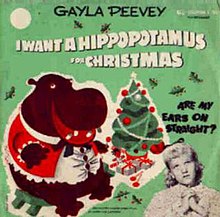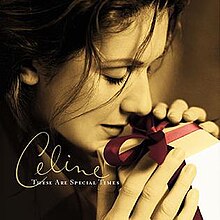
10. "Do They Know It's Christmas?" (1984) by Band Aid:
Basically this song is a huge guilty pleasure of mine. Although this song is great to sing when you are completely blasted out of your mind on wassail or holiday cheer, if you took a close look at the lyrics, you realize that they are extremely paternalistc and almost condescending. Tthink about it, the starving Ethiopians probably don't give a shit about Christmas, they care about food! Plus, your damn right, there will be no snow in Africa, because it is a sub-tropical continent. Another weird addition are the people who they picked to sing the song. Although some notable artists like Sting, David Bowie, and Bono make sense for their contributions to music, other artists that sang on the record have had less considerable staying power or have become a punch line for late time talk show hosts. Some of these artists include Boy George, George Michael, Bananarama, and Big Country. Plus the song made Bob Geldof one of the biggest douches of all time.

9. "I Want A Hippopotamus for Christmas" (1953) by Gayla Peevey:
This song, a suggestion from my friend Jen, is cute the first time you hear it, but gets annoying to down right wanting to kill yourself with each subsequent listen. If you haven't heard this song, even though I am sure you have, the song basically concerns how a little girl wants a Hippopotamus for Christmas. From the bassoons that seem out of place, to Peevy's nails on chalk board voice, this song is a good one to skip over during any holiday season. Plus why would you want a Hippo for Christmas? They're really big, aggressive and smell bad.

8. Rocking Around The Christmas Tree (1958) by Brenda Lee:
The first of our Christmas songs on this list to feature the new fangled music the kids are listening to called Rock and Roll, "Rocking Around The Christmas Tree" falls under the same category that "I Want A Hippo" falls under, in that the music doesn't fit the structure of the song, and the voice of Brenda Lee is down right annoying. Basically the song is about Rocking Around The Christmas Tree as it were, even though I don't really the know how that would be possible considering that you probably would knock over said Christmas tree. The music has a stupid guitar solo that sounds like they just put it in there to capitalize on rock and roll so the teenagers would buy the record, and Lee sounds terribly bored and annoying singing the song. Urban Legend says it that Lee's disdain for the song was so great that she tried inserting f-bombs into the recording. Plus, an even worse cornier version was made by LeAnn Rimes.

7. Last Christmas (1984)- by Wham!:
Wham!'s 1984 single Last Christmas has much in common with other Christmas songs from the 1980s in that almost all of them were synth-based bubblegum pop that while extremely catchy, became instantly overplayed and annoying. This begs the question: what made us so fond of the song to begin with. The song is basically about how George Michael has given his penis...errr I mean "heart"....to another person. The lyrics basically repeat the entire chorus over and over again and the stupid synth-based music gets into your damn head and it doesn't want to get out. Plus that single cover is horrible.

6. Winter Wonderland by Various Artists:
It appears that almost every single singer or band in the entire world has covered "Winter Wonderland" and why not? The song lends itself well because it is about Winter, thereby making it secular and therefore more PC than other christmas songs. But that doesn't mean that it sucks any less! Basically "Winter Wonderland" has an extremely terrible melody with equally excrutiating lyrics that talk about dressing up a snow man like a traveling parson and talking about how beautiful winter is, which I disagree with. Beside the first couple of days after the first snow fall, the beauty and joy of winter turns into dread due to the fact that you have to shovel said snow, stay inside, and have to deal with the freezing cold on a daily basis. Versions of this song have also been increasingly bizzarre with covers being done by Frank Sinatra, The Eurthymics, and perhaps the most bizarre interpretation of all: Jessica Simpson and Ozzy Osbourne. Seriously, youtube it, it's nuts.

5. O Holy Night (1998) by Celine Dion:
Let's not forget the real reason Christmas is celebrated, the birth of Jesus. But somehow this message gets lost in the crass commercialism that is the holiday season. Thankfully, there are carols and songs to remind us of the importance of the holiness of the day. Unfortunatly, "O Holy Night" by Celine Dion isn't one of them. This has to be one of the schmaltziest Christmas songs ever, which is saying quite alot. The song is full of sticky sentimentality and overblown production that make the song horrendous. It certainly doesn't help matters that Dion sings it in that extremely pompous voice of hers, as though she is the only one capable of telling the story of Jesus. On a personal note, I was subjected to this song so many times during the holiday season by my sister that one year it nearly ruined christmas for me.

4. It's The Most Wonderful Time Of The Year (1963) by Andy Williams:
I think the problem with this song that I have is that not only is it over played to the hilt, but its been used in a fashion to promote all the things that are wrong with Christmas, such as the extreme crass commercialism. This song has been used in almost every single coroporate commercial to promote products for Christmas and has also been used out of season for such other holiday sales like "Christmas in July", Memorial Day and even school supply shopping. Williams is completely hamming up his performance as the singer and the lyrics are especially corny.

3. Santa Baby by Eartha Kitt and Various Artists
Oh man, I really hate this song. When I was first compiling the list for Christmas songs, everybody told me that I had to include "Santa Baby", which of course has to be one of the worst Christmas songs ever. Basically the song is about how a girl is being slutty for Santa and basically wants to hump his brains out. While this would be every Santa's dream, the fact of the matter of is the song is quite disturbing. Think about it, would you really have sexual relations with an overweight married man who comes down your chimney every Christmas Eve? I didn't think so. What makes the song truly terrible is the way that singers sing this song, trying to make it sound sexy, but instead sounding like an annoying 13 year old (which adds to the overall creepiness of the song.) Versions include the original Earth Kitt version and the even creepier Madonna version.

2. Do You Hear What I Hear by Bing Crosby and Various Artists
The second song that has to do with Jesus on our list, "Do You Hear What I Hear" is one of the most overplayed holiday songs of all time. It doesn't add anything to the Christmas song canon and its constant bombardment on radio and tv make it excruciatingly horrible for the holiday season. For those who haven't heard it, the song is bascially about how a person hears, sees, knows, feels and tastes the birth of our Savior. The fact that this is one of the few Christmas songs about Jesus to have been covered by everyone also shows how a person cannot escape from this song. You would have to go to the remote wilds of Tibet or the Islamic Republic of Iran to fully escape from the carnage that is "Do You Hear What I Hear." However, I can't say that about the number one song on this list.

1. Jingle Bell Rock by Bobby Helms and Various Artists:
Finally, we have reached number 1, and I must say that this has to be not only of the worst Christmas songs, but one of the very worst songs of all time. There's a great line in the movie "Mean Girls" about how everyone in the Western World has heard "Jingle Bell Rock" at one time or another, and this is most certainly the case. What they also forgot to mention is that they're probably is no other Christmas song that has been as loathed and hated as Jingle Bell Rock. Seriously, the hatred that this song inspires from not only myself, but from other people borders on semi-psychotic. The song is so stupid and simple, that I'm kind of amazed that it has lasted this long as a holiday staple. If I had three wishes, one of them would be to destroy every copy of "Jingle Bell Rock" that has ever been pressed, recorded or covered by any artist.



